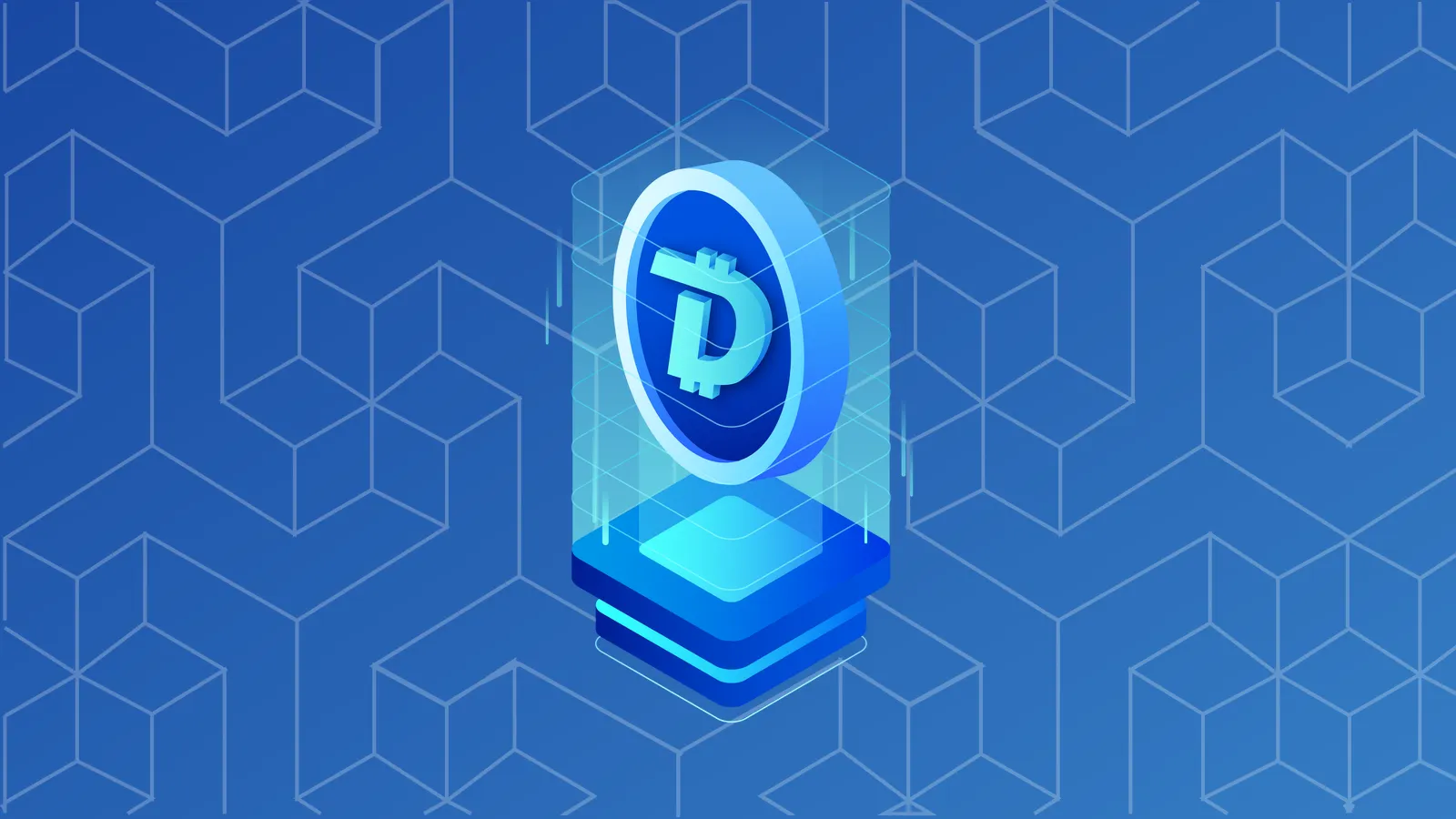In brief
- DigiByte argues that blockchains like Bitcoin and Ethereum are not secure or scalable enough.
- It's a complete blockchain network based on three different layers: smart contracts and dapps, a public ledger for the DigiByte native coin, and the system's core infrastructure.
- Unlike other Proof-of-Work (POW) cryptocurrencies, DigiByte supports five different mining algorithms.
According to DigiByte, blockchains like Bitcoin and Ethereum are not secure or scalable enough. DigiByte claims to have a proven and tested solution that is faster and safer than the competition.
What is DigiByte?
DigiByte is a complete blockchain network based on three different layers.
The top layer is for smart contracts, decentralized applications, and customizable tokens. The middle layer is the public ledger where the DigiByte native coin can move throughout the network and serve as its base asset. The bottom layer is the core infrastructure of the system and includes the decentralized nodes, the client software, and the communication between each.
Who Invented DigiByte?
Jared Tate is the founder and creator of DigiByte and worked on the project from 2013 through to 2020.
Did you know?
Both DigiByte and Bitcoin use Unspent Transaction Output (UTXO), which is a technical method for keeping track of
blockchain transactions between accounts. However, DigiByte has over 9 million blocks as of July 2019 compared to Bitcoin’s less than 600,000 blocks. DigiByte is also 40 times faster than Bitcoin, making it the fastest and longest UTXO blockchain in the world.
A brief history of DigiByte
- January 2014 – DigiByte is officially launched
- April 2017 – Segwit is activated on DigiByte becoming the first major altcoin to do so
- May 2019 – DigiAssets is launched
- February 2020 – DigiByte Foundation launched
What’s so special about it?
Secure and battle-tested in the wild for 6 years, DigiByte has proven that its security as a blockchain is for real. Its most unique feature is the fact that the blockchain network uses five mining algorithms when most only use one. These five different mining algorithms are meant to prevent mining centralization and make the network more secure and decentralized.
In addition to having five mining algorithms, DigiByte also claims to have the “most advanced difficulty stability” of any current blockchain. The advanced difficulty adjustments are meant to protect the DigiByte blockchain from malicious attacks and further improve security.
Did you know?
DigiByte has had over 275,000 full nodes downloaded since April 2017 and 15,000 nodes active globally.
What else is different?
The newest innovation from DigiByte is DigiAssets, which is the top layer of the DigiByte blockchain that allows for smart contracts, decentralized applications, and programmable tokens. Because of DigiByte’s heightened security and scalability, the team believes that it offers the ideal base protocol for a platform like DigiAssets.
The first two DigiAssets were created by DigiByte founder, Jared Tate, in April 2019. The DigiTorch and DigiFlame are both meant to be passed on from different DigiByte community members as they build new projects on DigiAssets.
How is DigiByte produced?
DigiByte has a fixed supply and distribution schedule. A total of 21 billion DigiByte will be created within 21 years. Since there was no ICO or Token Generation Event, new DigiByte have been and always will be created through mining. The first DigiByte was mined in 2014 and the last of the 21 billion coins will be mined in 2035.
How do you get hold of DigiByte?
DigiByte can be purchased and traded on major exchanges such as Bittrex. To use DigiByte off an exchange, you will have to download a DigiByte wallet. You can also earn DigiBytes through mining.
How to mine DigiByte
Unlike many other Proof-of-Work (POW) cryptocurrencies, DigiByte supports five different mining algorithms: Sha256, Scrypt, Skein, Qubit and Odocrypt. Mining rewards are distributed equally to miners on each algo, with 20% of rewards distributed to each.
Because of this, it’s possible to mine DigiByte on practically any type of computer hardware by CPU or GPU mining, or it can be mined on specialized ASIC hardware—like Bitcoin. Once you’ve chosen which algorithm you’ll use to mine, it’s simply a matter of choosing a DigiByte mining pool and downloading the appropriate mining software; CCMiner for Nvidia cards, Claymore miner for AMD GPUs, and AwesomeMiner for CPU mining.
Once installed, you’ll need to configure your pool and set your DigiByte address, after which you can begin mining.
How to buy DigiByte
Although DigiByte can be mined, doing so is a time-consuming process, and requires expensive hardware to make it worth your while. That means you’ll likely be better served by buying it outright.
How you go about doing this depends on your payment method, and how much DGB you are looking to buy. But in general, buying in using another cryptocurrency is the cheapest way with the fewest obstacles, while using your debit or credit card will likely be more expensive, and will almost certainly require you to complete KYC verification first.
According to CoinGecko, DigiByte is currently listed on several dozen cryptocurrency exchange platforms, including well-reputed platforms like Binance, Kucoin, Bittrex, and OKEx. Through one of these platforms, it can be traded against other cryptocurrencies like Bitcoin (BTC), Ethereum (ETH), and Tether (USDt).
For those looking to purchase DGB with a credit or debit card, there are fewer options. Currently, just a handful of brokers offer fiat purchases for DGB, including Changelly and Coindirect. The DigiByte Foundation also allows users to purchase DGB using credit or debit cards through its partnership with Change Angel.
What can you do with DigiByte?
Like Bitcoin, DigiByte can be used for payments or transferring value. However, DigiByte is also used as the fuel to run the DigiAsset smart contract network. In this context, DigiByte functions like gas in Ethereum to pay for transactions or as the carrier for other assets and code to be sent and received.
The Future of DigiByte
Besides continually developing technical upgrades and improvements to the core protocol, DigiByte launched DigiStats in the fall of 2019 to provide interactive and historical blockchain statistics, increase mobile and payment processing options, and create more fiat and USDT stablecoin pairings on different exchanges.
In early 2020, as the network turned six, the company launched the DigiByte Foundation, designed to help with fund-raising inside the community.
The Foundation is currently working on securing partnerships for the project, as well as promoting the awareness and adoption of DigiByte. In July 2020, it launched the DigiBee donation platform, which enables contributors to pay towards the maintenance and further development of DigiByte’s ecosystem, and entitles them to voting rights around DigiByte Foundation decisions requiring community involvement.
The biggest and most important upcoming plan for DigiByte will be growing DigiAssets. If all goes according to plan, an entire ecosystem of dapps and ICO will be an integral part of the network.
Recent developments and price action
DigiByte, like many other cryptocurrencies, has seen a bullish change in its trend. As of September 2020, DGB is trading at $0.0224, with a market capitalization of $303 million.
DigiByte’s price has been on a strong uptrend since reaching a 2020 low of $0.003 in mid-March, and spiked to as high as $0.0366, before falling back somewhat to its current price. DGB reached a peak improvement of 601% year-to-date (YTD) but is still up 329% YTD.
DigiByte was listed on several smaller exchange platforms in the second and third quarters of 2020, including OceanEx, LBank, and Bilaxy, and DigiByte Founder Jared Tate stepped down from his position in May 2020.
The team behind DigiByte is currently working on the development of the next iteration of the project, and building out the utility of the token.
Stay on top of crypto news, get daily updates in your inbox.







